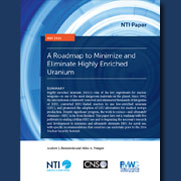
Comprehensive Update of HEU Resources Now Available
The Civilian HEU Reduction and Elimination Resource Collection has been updated by CNS in the wake of the April 2016 Nuclear Security Summit (NSS).
NTI Commits $5 Million To Help Secure Vulnerable Nuclear Weapons Material
The Nuclear Threat Initiative (NTI) has committed up to $5 million to catalyze a project that allowed the United States, Russia and Yugoslavia to remove two and a half nuclear bombs worth of vulnerable highly enriched uranium (HEU) from a poorly secured research reactor in Belgrade.
All three countries agree that the fresh HEU fuel at the Vinca Institute of Nuclear Sciences near Belgrade was vulnerable to theft by terrorists. However, Yugoslavia also needed international assistance to address problems related to 2.4 tons of highly radioactive spent reactor fuel at Vinca and to decommission the Vinca research reactor. The U.S. government lacks the authority to fund such work and asked NTI to contribute to a joint project. This was an essential part of the deal for Yugoslavia and its people, and the Yugoslavs made it clear that the HEU would not be moved unless resources were provided for managing its spent fuel.
“Stopping terrorists from acquiring nuclear weapons boils down to one top priority: stopping them from getting nuclear bomb-making materials,” said Ted Turner, co-chairman of NTI. “Project Vinca is an important step forward in keeping dangerous materials secure and less vulnerable to terrorist theft. It is also an example of how governments, the private sector and international organizations can work together to find innovative and effective solutions to make the world safer.”
“The United States, Russia and Yugoslavia are to be commended for the foresight and creativity needed to make this project a reality,” said former Senator Sam Nunn, co-chairman of NTI. “Highly enriched uranium is the raw material for catastrophic terrorism, and it requires the same security discipline that we currently apply to nuclear weapons. Project Vinca is a significant global security achievement and a model for action and future cooperation.”
NTI has worked extensively with the U.S. Department of State, the International Atomic Energy Agency (IAEA), and Yugoslavia over the last year on Project Vinca. As a general rule, NTI does not undertake activities that are inherently the responsibility of government. In Project Vinca, NTI filled a gap that the U.S. government was not able to address, since the U.S. government has no authority to provide assistance for spent fuel management.
“I believe that the U.S. Congress must give the Administration funding flexibility to deal with collateral matters that are essential to our government’s core mission – providing security for weapons materials,” said former Senator Nunn. “It is my belief that without NTI’s willingness to fill in this gap, the project would not have gone forward.”
U.S. Deputy Secretary of State Richard Armitage informed NTI that its efforts were “critical to and a major factor in bringing this important non-proliferation deal to closure.”
Working through the IAEA, NTI’s funding will help address critical safety and environmental problems posed by the spent nuclear fuel at Vinca. In parallel with the removal and elimination of the fresh HEU fuel, the IAEA will work closely with Vinca to plan and execute the decommissioning of their reactor facilities, using NTI-provided resources as well as IAEA funds. The funding will allow the IAEA and Vinca to prepare the spent fuel pool for draining and spent fuel processing, among other tasks. The IAEA’s role is important because of its decade of close cooperation with Vinca and its ability to maximize the efficiency of the project.
The 48 kilograms (over 100 pounds) of weapons-usable material was flown out of Belgrade on August 22 and is being securely stored at the Russian Institute of Atomic Reactors in Dmitrovgrad, which has received upgrades to its security system under the U.S. Department of Energy’s Material Protection Control and Accounting program. Blenddown of the materials will be monitored by U.S. representatives as part of the Department of Energy’s Material Consolidation and Conversion program.
“Project Vinca demonstrates the kind of work that needs to be done under the recently announced G-8 commitment to develop an international partnership, with $20 billion in funding over ten years to support it, to prevent terrorists from acquiring weapons of mass destruction,” said former Senator Nunn. “All weapons and weapons material on a global basis — wherever located — must be accounted for and made secure. This will require a global partnership against catastrophic terrorism.”
###
The Nuclear Threat Initiative (NTI) is a private charitable foundation working to reduce the threats from nuclear, biological and chemical weapons.
Sign up for our newsletter to get the latest on nuclear and biological threats.
The Civilian HEU Reduction and Elimination Resource Collection has been updated by CNS in the wake of the April 2016 Nuclear Security Summit (NSS).
A new paper published by NTI, the Center for Nonproliferation Studies and the Fissile Materials Working Group offers timely recommendations for action that countries can pursue ahead of the 2016 Nuclear Security Summit.
NTI Co-Chairman Sam Nunn welcomes the news that Ukraine will eliminate its highly enriched uranium.
